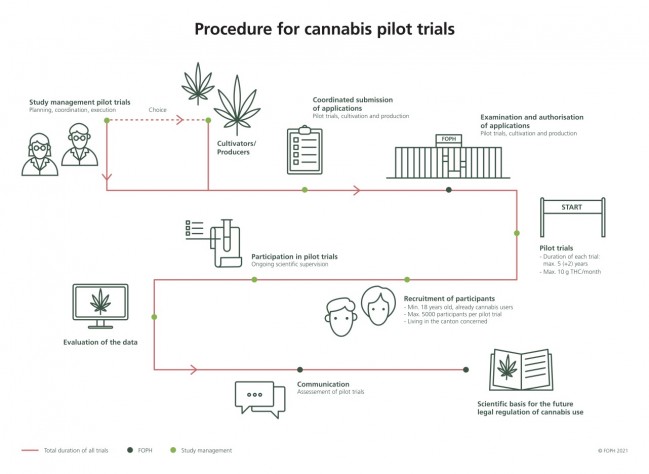
Cannabis pilot trials: designed to gain insights for future regulation
Dec. 2023Cannabis policy – what’s next?
A number of cannabis pilot trials have been started since early 2023 with the aim of creating a scientific basis for future legal regulation. The pilot trials are being planned and performed on the initiative of various stakeholders, among them cities and municipalities, and require approval from the Federal Office of Public Health (FOPH).
Selling and consuming cannabis products with a THC content of at least one per cent is prohibited in Switzerland. Consumption is nonetheless widespread. Users’ safety in terms of product quality cannot be guaranteed because cannabis products are sold on the black market.
In September 2020, Parliament therefore passed an amendment to the Narcotics Act (NarcA) creating a legal basis for conducting scientific pilot trials that are limited to five years and to one or several municipalities. The aim of the pilot trials is to provide scientific findings on controlled sales of cannabis products, thus creating a basis for decisions relating to possible future regulation.

Strict requirements
Unlike cannabis dispensed for medical uses, the pilot trials involve sales of cannabis for recreational purposes. Stringent requirements seek to ensure prevention and health protection, including a strict ban on advertising for cannabis products. The pilot trials will also make provision for the protection of children and adolescents, for example by using child-resistant packaging featuring warnings. Trained staff at points of sale will also make participants aware of the risks associated with consumption. The amount of cannabis that can be purchased on each occasion and per month is limited, and reselling and consumption in public places are prohibited. The products offered must also meet strict quality requirements, come from organically cultivated plants and be of Swiss origin.
Adults who are demonstrably already using cannabis, at least 18 years of age and capable of judgement and have not been diagnosed with any diseases that could worsen as a result of consuming cannabis are eligible to participate in the trials. The health of participants will be monitored throughout the trials.
Six pilot trials approved
Currently (in November 2023) six pilot trials have been approved:
- WeedCare (Basel)
- Züri Can – Cannabis with responsibility (Zurich)
- Cann-L (Lausanne)
- La Cannabinothèque (Geneva)
- SCRIPT (Bern, Biel, Lucerne)
- Grashaus Projects BL (Allschwil, Liestal)
The first pilot trial, the “WeedCare” project, started selling cannabis products at the end of January 2023. The 374 participants are between 18 and 76 years old, with an average age of 36. “Sales of the six available products in the nine pharmacies taking part in the trial have gone smoothly so far,” reports Regine Steinauer. She is head of the Addiction Department in the Basel-Stadt Public Health Office, which is carrying out the “WeedCare” project in conjunction with the University Psychiatric Clinics (UPK) Basel, the University of Basel and Aargau Psychiatric Services. Steinauer says that it’s not yet possible to say whether the participants are happy with the setting: “Participants’ satisfaction is checked regularly using questionnaires, and the evaluation won’t be available until a year has passed. But so far there have been very few dropouts.”
Different sales settings
While the “WeedCare” study involves sales only in pharmacies, the cannabis products in the “Züri Can” pilot trial have been distributed through pharmacies, a drug information centre and so-called social clubs since August 2023. The last of these are places where cannabis products can not only be purchased but also consumed in the company of other users. Non-profit-oriented association models are also being tested (e.g. the La Cannabinothèque pilot trial in Geneva).
Gather information
The objective of all the pilot trials is to gather information about the advantages and disadvantages of controlled access to cannabis. In addition to the impact on physical and mental health and consumption habits, these also include socio-economic aspects such as effects on ability to work and social interactions. Effects on the local black market, youth protection or public safety may also be studied.
The individuals responsible for the pilot trials decide which specific research questions will be elaborated and studied. They are required to report their progress to the FOPH annually and to present the results in a research report. The FOPH will evaluate all the trials in a meta-study and will summarise the findings in a report for the Federal Council. Since Parliament has already started working on a new regulation for cannabis, the trials will be evaluated on an ongoing basis so that the experience gained can be fed into the political process.

_slider_small.png?lm=1702372067)


